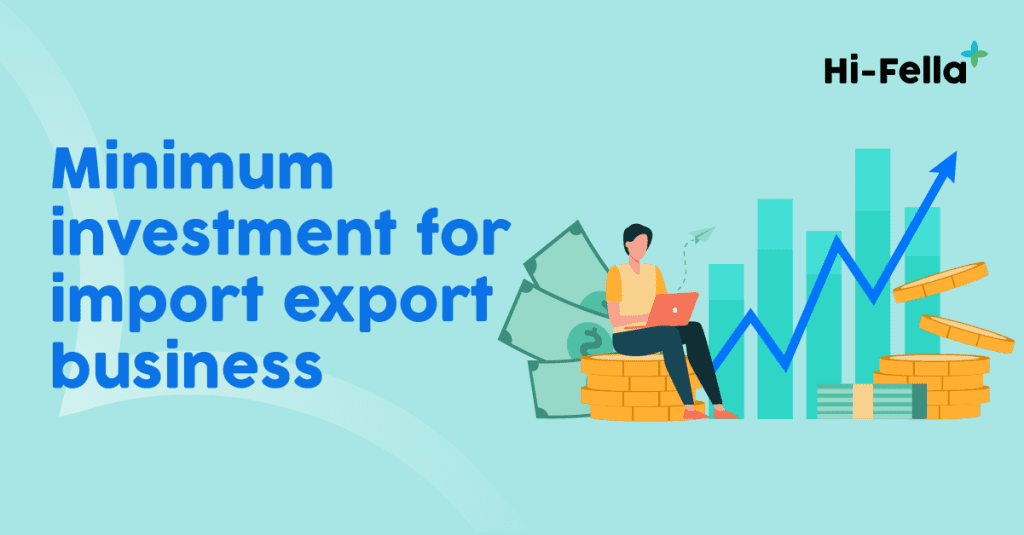Starting an import-export business is a tantalizing prospect, one that holds the promise of international adventure and potentially lucrative returns. Yet, as with any venture, it demands a financial commitment that hinges on a critical question: what’s the minimum investment required to embark on this journey? Understanding the minimum investment requirements is your first step toward making informed decisions and charting a successful course in the world of international trade. Learn the minimum investment needed for a successful entry into the global trade arena.
It is inevitable that import-export activity has so much cost behind it. From licenses, permits, shipping, logistics, and even marketing. For example, licenses in the USA. In the USA, most import/export licenses do not require fees. For imports, you typically fill out forms and follow guidelines. For exports, the Bureau of Industry and Security (BIS) usually doesn’t charge for licenses. But if you deal with wildlife goods, the US Fish & Wildlife Service (FWS) may charge a $100 fee for new permits, renewals, and $50 for amendments.
Another example is shipping and logistics costs for export and import. You have to be aware of additional expenses that can arise in the shipping process, beyond the basic transportation fees. These hidden costs include customs duties, taxes, port fees, storage charges, and more. Importers and exporters need to be aware of these potential expenses to budget effectively and ensure a smooth shipping experience. It underscores the importance of thorough research and planning when engaging in international trade to have minimum investment for import-export business. Keep in mind that these costs really depend on where you live, what your country’s destination is, and what goods you want to import or export. So, you need to research first for it to reach minimum investment for import export business.
This budget example for a medium-scale import-export business outlines the key expenses involved in starting and running the business. It covers licensing and permits, shipping and logistics, marketing, inventory, and miscellaneous costs, providing a comprehensive overview of financial requirements. Additionally, the mention of monthly operating expenses underscores the importance of careful financial management in the world of international trade.
- Licensing and Permits
Export License: $2,000
Import License: $1,500
Customs Permits: $1,000
Compliance Consultation: $3,000
Total: $7,500 - Shipping and Logistics
Shipping Costs (for initial inventory): $20,000
Customs Duties and Taxes: $5,000
Warehousing and Storage: $3,000
Freight Forwarder Fees: $2,500
Total: $30,500 - Marketing
Market Research: $2,000
Website Development (e-commerce platform): $5,000
Online Advertising (first 3 months): $7,500
Trade Show Participation: $4,000
Total: $18,500 - Inventory
Initial Inventory of Electronics (100 units): $25,000
Initial Inventory of Fashion Accessories (500 pieces): $10,000
Total: $35,000 - Miscellaneous Expenses
Legal Fees: $2,500
Insurance (for shipments): $1,500
Contingency Fund: $5,000
Total: $9,000
Total Startup Budget: $100,500 - Monthly Operating Costs
Employee Salaries (2 employees): $8,000
Rent for Office/Warehouse: $2,500
Utilities: $500
Marketing and Advertising (ongoing): $2,500
Maintenance and Repairs: $1,000
Total Monthly Costs: $14,500
To reach minimum investment for import export business, you could follow these tips for cost-saving strategies.
- Optimize transportation and logistics
Efficient logistics and transportation management can significantly reduce costs. This includes choosing the right shipping methods, optimizing shipping routes, and consolidating shipments to minimize transportation expenses. - Utilize technology and automation
Leveraging technology such as supply chain management software, automated inventory tracking systems, and digital communication tools can streamline operations, reduce errors, and cut down on labor costs. - Improve inventory management
Effective inventory management involves maintaining optimal stock levels to avoid overstocking or understocking. This helps in reducing storage costs and ensuring that capital is not tied up unnecessarily. - Leverage economies of scale
As a business grows, it can negotiate better rates with suppliers and logistics providers due to increased volume. This leads to cost savings that can be passed on to customers or improve profit margins. - Build strong supplier relationships
Cultivating strong relationships with suppliers can result in better terms, discounts, and cooperative arrangements, which can lead to cost reductions and a more reliable supply chain. - Stay informed about trade regulations
Keeping up-to-date with changing import and export regulations is essential. Non-compliance can lead to fines and delays. Staying informed helps businesses navigate customs and compliance efficiently. - Explore financing options
Businesses can explore various financing options, such as trade finance, working capital loans, or export credit insurance, to better manage cash flow and mitigate financial risks associated with international trade.
To minimize investment for import export business, you can try government grants and incentives for new exporters. Many governments offer incentives for new exporters, including grants, tax benefits, and trade promotion programs. Research your country’s trade and export development agencies for specific opportunities. For example, the USA. Empire State Development provides assistance for exporters through their Global NY program. This is their program.
- The Export Marketing Assistance Service
It helps businesses identify promising export opportunities and find suitable agents or partners in international markets. - The Global NY State Trade Expansion Program
This resource also extends financial support to businesses by offering grants and loans, enabling them to explore trade opportunities and promote their products effectively in foreign markets. - The Global NY Grant Fund Program
This resource provides grants to help businesses start exporting or expand their exports, as well as grants for non-profit organizations that offer export assistance or trade education. Businesses can receive up to $25,000, while non-profits can access grants of up to $50,000.
Besides government grants and incentives, you can also try to search for financing options such as loans, inventors, export credit agencies, and crowdfunding to minimize investment for import export business. You can try to consider bank loans or trade finance options for working capital and expansion. Seek out angel investors or venture capitalists interested in international trade ventures. Some countries have agencies that provide insurance and financial support to exporters. Explore crowdfunding platforms to raise capital for specific export projects.
Ready to take your export-import endeavors to the next level? Join Hi-Fella now, an online platform where suppliers and buyers from around the world meet. Only by downloading the Hi-Fella app on Play Store or App Store and signing up for an account, you are able to open the door to limitless international opportunities for your business! Join us now!








